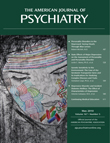Drs. Harmer, Goodwin, and Cowen Reply
To the Editor: We thank Dr. Hierholzer for his interest in our hypothesis that antidepressant drug treatments have early effects on the evaluation of emotional material, which are important in the development of clinical mood change over time (1). We agree that this hypothesis of antidepressant drug action may also extend to anxiety disorders. In his clinical observations, he suggests that anger is reduced early on with SSRI treatment in PTSD. These clinical observations are consistent with an earlier study (2), which found a decrease in anger recognition following 7 days of administration of the SSRI citalopram in healthy volunteers. It is encouraging that these findings in healthy people in a laboratory setting may translate into a different patient group and to a real-world setting. Consistent with these findings, Davidson et al. (3) reported that early effects on anger and irritability were predictive of therapeutic response to sertraline in individuals with PTSD.
To test Dr. Hierholzer's clinical observations using a cognitive psychology approach, it will be important to observe whether behavioral and neural biases toward anger-related stimuli can be measured in PTSD and whether these are resolved early in the course of SSRI treatment. It will also be important to assess whether the magnitude of change in anger processing seen early on in treatment is able to predict later therapeutic benefit of drug treatment. These clinical observations are vital in the interpretation of our laboratory findings, and we hope that the continued interplay between clinical and empirical data will further build upon this approach.
1 : Why do antidepressants take so long to work? A cognitive neuropsychological model of antidepressant drug action. Br J Psychiatry 2009; 195:102–108 Crossref, Medline, Google Scholar
2 : Increased positive versus negative affective perception and memory in healthy volunteers following selective serotonin and norepinephrine reuptake inhibition. Am J Psychiatry 2004; 161:1256–1263 Link, Google Scholar
3 : Improvement of anger at one week predicts the effects of sertraline and placebo in PTSD. J Psychiatr Res 2004; 38:497–502 Crossref, Medline, Google Scholar



